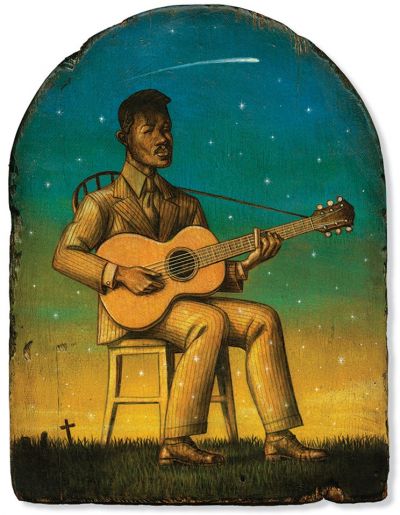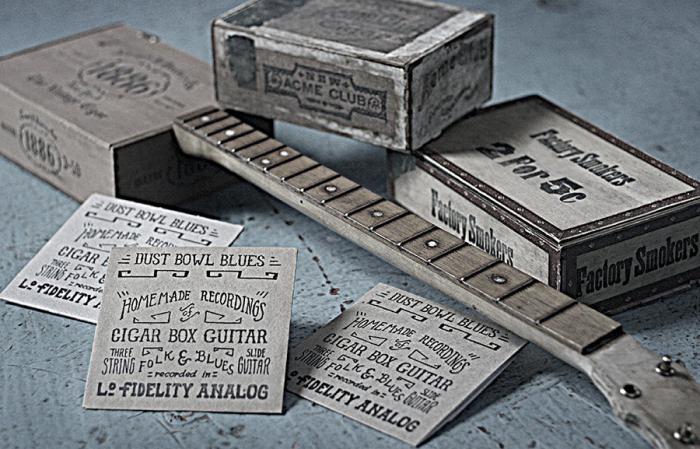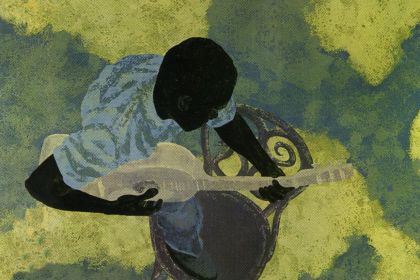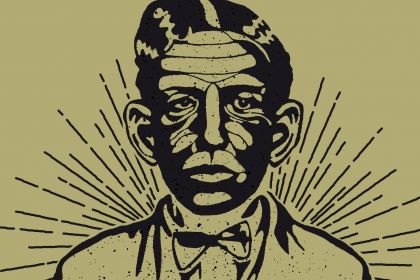SONGWRITER
The bottleneck guitar blues by Blind Willie Johnson is sliding through space on the Voyager Golden Records

Blind Willie Johnson
Among the musical works sent by NASA into space to represent the cultural values of mankind, sharing its rightfully earned place with the masterpieces of Bach, Mozart, and Beethoven, is a gospel-blues song by one Blind Willie Johnson based on the popular Baptist hymn Dark Was the Night, Cold Was the Ground which he recorded in the late 1920s.
Very little is known about Blind Willie Johnson’s life but his slide guitar technique had a tremendous impact on the next-generation blues musicians including Robert Johnson and Muddy Waters. Jimmy Page, Eric Clapton, and many other artists who shaped the popular rock music scene of the 1960s single out Blind Willie Johnson's enormous influence on their musical education and performing skills.
Willie Johnson was born in 1897 in a family of a sharecropper in a small town in Texas. He discovered music early through Sunday visits to a Baptist church and started learning his skill with the help of a cigar-box guitar given to him by his father at the age of five. There are several theories explaining his blindness, all of which agree on the fact that the musician lost his sight in early childhood due to an accident.
The cigar box guitar:


Never considering himself a blues singer, Willie Johnson composed his repertoire from church hymns and psalms which he sang with a deep and raspy bass to accompany his stunning guitar performance. Since he was just a blind street singer with a donation can attached to his guitar, the existence of his original recordings made at Columbia's field unit—that traveled to smaller towns to record local talent—is a true treasure for modern listeners.
Listen to Blind Willie Johnson perform Dark Was the Night, Cold Was the Ground:
This song sent by NASA to space features an incredible slide technique that had given rise to a whole guitar trend in subsequent years after its release in 1927. Although there is evidence that the guitarist used a penknife instead of a bottleneck, this version is unlikely because the slide sound in the recording is quite "glassy".
Here’s how contemporary blues-folk guitarist Steve James describes his research on Blind Willie Johnson’s slide technique:
“A friend of mine and I were listening to one of his recordings, and we stayed up all night, slowed down the turntable, played it over and over. We figured out he got twelve separate pitches by striking the string once, all inside one measure. I’ve been trying to do that for twenty-five years, and I can do seven or eight."
Attention to Blind Willie Johnson's creativity was not only expressed by guitarists but many other artists who have been recording covers in various genres for almost a hundred years.
Listen to Tom Waits' cover of Blind Willie Johnson's John the Revelator:
During his life, Blind Willie Johnson made a number of popular recordings for the solid profit of Columbia Records but this did not help to fix the financial problems of the poor musician since he was paid only 50 dollars per session. Having recorded only thirty songs in five sessions at the end of the 1920s, he continued his street performances in various cities in Texas during the Great Depression.
In the mid-1940s, Willie Johnson settled in Beaumont where—in accordance with a city directory—he operated the House of Prayer at Forrest Street. It is reported that in 1945 the house in which he lived burned down, forcing the singer to live in the ruins where he fell ill with malaria fever that claimed his life the same year.
Watch Blind Willie Johnson’s John the Revelator covered by Depeche Mode whose composer and lyricist Martin Gore is known for his tendency to use evangelical motifs in his work:



